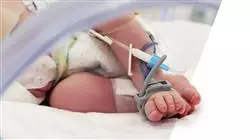University certificate
The world's largest faculty of medicine”
Introduction to the Program
A Professional master’s degree 100% online that will bring you up to date in the main Endocrine, Neurological, Respiratory or Immunological disorders in newborn patients”

Scientific advances have allowed in recent years to incorporate to the Neonatal Units the most accurate pharmacology to address respiratory and neurological pathologies, Sepsis or complex infections such as Meningitis. Likewise, the promotion of good family-centered care practices, the strengthening of breastfeeding and progress in specific formulas for premature infants have had a significant influence on their survival and patient satisfaction.
In this sense, professionals dedicated to this area of Pediatrics are faced with a daily challenge in the management of newborns who present from very frequent disorders such as jaundice to diseases considered rare in which significant advances have been achieved. In this line, TECH has decided to create this 12-month Professional master’s degree in Neonatology, designed by an excellent team of experts in this field.
It is an intensive program that will provide the graduate with a complete update on working methods in Neonatology, the assessment of preterm infants, pulmonary development and pathophysiology, the proper management of oxygen therapy, the approach to borderline situations and the singularities in the case of Neonatal Sepsis.
All this, in addition, with a syllabus designed with a theoretical-practical perspective and complementary teaching material based on video summaries of each topic, videos in detail, readings of scientific research and case studies that the doctor will access comfortably, at any time of the day, from a cell phone, tablet or computer with an Internet connection.
A university qualification that does not require attendance at centers or classes with pre-set schedules, so that the professional will have greater freedom to self-manage their access time and reconcile their daily activities with quality teaching.
The Relearning method will allow you to reduce the hours of study and focus on the most important concepts of this degree in Neonatology”
This Professional master’s degree in Neonatology contains the most complete and up-to-date scientific program on the market. Its most notable features are:
- The development of practical cases presented by experts in Pediatrics and Neonatology
- The graphic, schematic and practical contents with which it is conceived provide scientific and practical information on those disciplines that are essential for professional practice
- Practical exercises where the self-assessment process can be carried out to improve learning
- Its special emphasis on innovative methodologies
- Theoretical lessons, questions to the expert, debate forums on controversial topics, and individual reflection assignments
- Content that is accessible from any fixed or portable device with an Internet connection
The clinical cases in this program will allow you to stay up to date on Neonatal Resuscitation procedures”
The program’s teaching staff includes professionals from the field who contribute their work experience to this educational program, as well as renowned specialists from leading societies and prestigious universities.
The multimedia content, developed with the latest educational technology, will provide the professional with situated and contextual learning, i.e., a simulated environment that will provide immersive education programmed to prepare for real situations.
This program is designed around Problem-Based Learning, whereby the professional must try to solve the different professional practice situations that arise during the course. For this purpose, students will be assisted by an innovative interactive video system created by renowned and experienced experts.
Delve into the therapeutic options for renal replacement, such as peritoneal dialysis, in the newborn patient"

Take the opportunity to learn about the latest advances in this field and apply it to your daily practice"
Why study at TECH?
TECH is the world’s largest online university. With an impressive catalog of more than 14,000 university programs available in 11 languages, it is positioned as a leader in employability, with a 99% job placement rate. In addition, it relies on an enormous faculty of more than 6,000 professors of the highest international renown.

Study at the world's largest online university and guarantee your professional success. The future starts at TECH”
The world’s best online university according to FORBES
The prestigious Forbes magazine, specialized in business and finance, has highlighted TECH as “the world's best online university” This is what they have recently stated in an article in their digital edition in which they echo the success story of this institution, “thanks to the academic offer it provides, the selection of its teaching staff, and an innovative learning method aimed at educating the professionals of the future”
A revolutionary study method, a cutting-edge faculty and a practical focus: the key to TECH's success.
The most complete study plans on the university scene
TECH offers the most complete study plans on the university scene, with syllabuses that cover fundamental concepts and, at the same time, the main scientific advances in their specific scientific areas. In addition, these programs are continuously being updated to guarantee students the academic vanguard and the most in-demand professional skills. In this way, the university's qualifications provide its graduates with a significant advantage to propel their careers to success.
TECH offers the most comprehensive and intensive study plans on the current university scene.
A world-class teaching staff
TECH's teaching staff is made up of more than 6,000 professors with the highest international recognition. Professors, researchers and top executives of multinational companies, including Isaiah Covington, performance coach of the Boston Celtics; Magda Romanska, principal investigator at Harvard MetaLAB; Ignacio Wistumba, chairman of the department of translational molecular pathology at MD Anderson Cancer Center; and D.W. Pine, creative director of TIME magazine, among others.
Internationally renowned experts, specialized in different branches of Health, Technology, Communication and Business, form part of the TECH faculty.
A unique learning method
TECH is the first university to use Relearning in all its programs. It is the best online learning methodology, accredited with international teaching quality certifications, provided by prestigious educational agencies. In addition, this disruptive educational model is complemented with the “Case Method”, thereby setting up a unique online teaching strategy. Innovative teaching resources are also implemented, including detailed videos, infographics and interactive summaries.
TECH combines Relearning and the Case Method in all its university programs to guarantee excellent theoretical and practical learning, studying whenever and wherever you want.
The world's largest online university
TECH is the world’s largest online university. We are the largest educational institution, with the best and widest online educational catalog, one hundred percent online and covering the vast majority of areas of knowledge. We offer a large selection of our own degrees and accredited online undergraduate and postgraduate degrees. In total, more than 14,000 university degrees, in eleven different languages, make us the largest educational largest in the world.
TECH has the world's most extensive catalog of academic and official programs, available in more than 11 languages.
Google Premier Partner
The American technology giant has awarded TECH the Google Google Premier Partner badge. This award, which is only available to 3% of the world's companies, highlights the efficient, flexible and tailored experience that this university provides to students. The recognition as a Google Premier Partner not only accredits the maximum rigor, performance and investment in TECH's digital infrastructures, but also places this university as one of the world's leading technology companies.
Google has positioned TECH in the top 3% of the world's most important technology companies by awarding it its Google Premier Partner badge.
The official online university of the NBA
TECH is the official online university of the NBA. Thanks to our agreement with the biggest league in basketball, we offer our students exclusive university programs, as well as a wide variety of educational resources focused on the business of the league and other areas of the sports industry. Each program is made up of a uniquely designed syllabus and features exceptional guest hosts: professionals with a distinguished sports background who will offer their expertise on the most relevant topics.
TECH has been selected by the NBA, the world's top basketball league, as its official online university.
The top-rated university by its students
Students have positioned TECH as the world's top-rated university on the main review websites, with a highest rating of 4.9 out of 5, obtained from more than 1,000 reviews. These results consolidate TECH as the benchmark university institution at an international level, reflecting the excellence and positive impact of its educational model.” reflecting the excellence and positive impact of its educational model.”
TECH is the world’s top-rated university by its students.
Leaders in employability
TECH has managed to become the leading university in employability. 99% of its students obtain jobs in the academic field they have studied, within one year of completing any of the university's programs. A similar number achieve immediate career enhancement. All this thanks to a study methodology that bases its effectiveness on the acquisition of practical skills, which are absolutely necessary for professional development.
99% of TECH graduates find a job within a year of completing their studies.
Professional Master's Degree in Neonatology
Neonatology is a specialized medical discipline that is responsible for the care of newborns who are premature, sick or have complex medical conditions. At TECH Global University, we understand the importance of having highly qualified professionals in this area, and for this reason, we have designed the Professional Master's Degree in Neonatology, a cutting-edge online postgraduate program that will provide you with the tools and knowledge necessary to provide specialized care for neonates. In this Professional Master's Degree, you will learn about advances in the diagnosis and treatment of neonatal diseases, the management of prematurity, the care of newborns with respiratory, cardiovascular, metabolic and neurological diseases, among other relevant topics. Our practical and evidence-based approach will allow you to acquire advanced clinical skills and develop a comprehensive and humane approach to neonatal care.
Neonatal care requires a high level of specialization and expertise, and with our Professional Master's Degree in Neonatology you will be prepared to meet the clinical challenges and provide quality care to newborns and their families. You will have a team of expert professors in the field, exclusive multimedia content, cutting-edge methodologies that optimize learning such as the Relearning system, and review of clinical cases in a simulated environment that will allow you to apply what you have learned. Do you want to stand out as a medical professional in the field of neonatology? Enroll at TECH!







